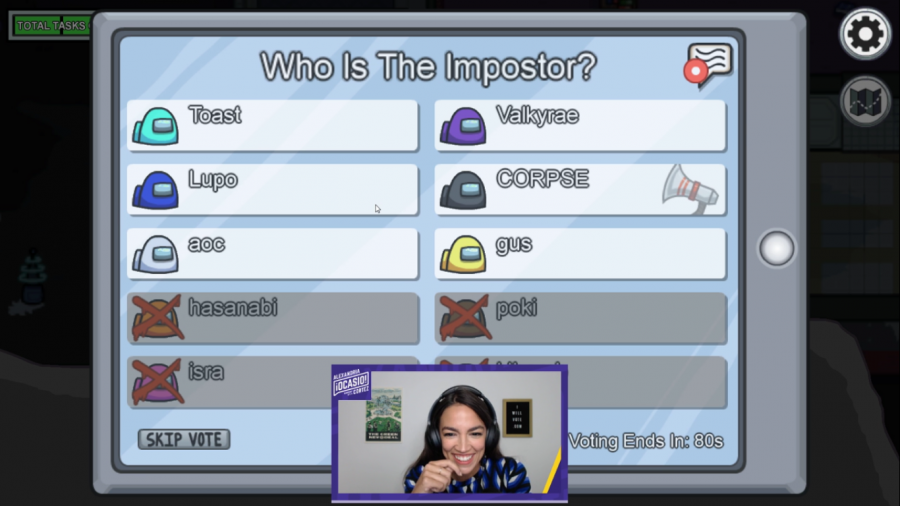Streaming: The Future of Voter Outreach?
Rep. Alexandria Ocasio-Cortez recently live-streamed the hit video game “Among Us” on Twitch with Ilhan Omar, Ilhan Omar’s daughter, Isra, the artist mxmtoon and other prominent Twitch streamers. The three hour event was meant to encourage people to get out and vote for this November election, but quickly became the third most-watched stream in Twitch’s history. It was also just fun to watch.
With 2020 being the dumpster fire that it is, many people have turned to playing video games extensively or watching Twitch streams to pass the time. Well, if you went onto Twitch the night Ocasio-Cortez was streaming, you might be surprised to know that she was at the top of the list for the number of viewers that night. Most of the other top streamers were people she was playing “Among Us” with.
You would think that if a politician were to be on a platform that they’re not used to, they would be talking about politics the whole time. With Ocasio-Cortez on Twitch, that wasn’t quite the case. While she did talk about the importance of getting out to vote, voting early, how to register to vote, etc., it wasn’t overwhelming as most of the stream was focused on actually playing “Among Us.” Like most politicians on social media, she had trolls in her stream’s comment section. Many criticized her for being “childish” for playing a game instead of working.
To say many of the people criticizing her were older would be an understatement. I’m not sure how politicians reached out to them when they were young, but Ocasio-Cortez knows her audience online, which is younger. This stream was definitely geared towards high school and college-aged students. It also had the benefit of reaching viewers from outside of her district, and all from her home in New York. There are large implications for future elections if streaming picks up steam as a way to reach out to young people.
The advantages of this medium include the fact that it can be done relatively easily and cheaply compared to an on-the-ground presence. On the other hand, the candidate won’t have the face to face interaction with people in their district, which may have a detrimental effect on public support and indirectly decide who wins the election. Realistically, if candidates want to maximize voter turnout in their favor, they will most likely have to utilize both streaming and on the ground operations to reach both young and older voters.
On the stream, Ocasio-Cortez featured several streamers from other countries, such as Canada and the U.K. When she asked a streamer from the U.K. about healthcare costs, they explained about how there are no out-of-pocket costs for them. The streamer also joked that they go home to Google how much their medication would have cost in the U.S. Bringing in perspectives from other countries in such a direct manner would also allow people to compare and contrast our country with others on the spot.
I doubt that Ocasio-Cortez will be the only politician who will use streaming as a way to connect with younger voters. However, it will also depend on who the politician is. Younger voters generally lean left, so politicians who hold similar views will gain more viewership as opposed to right-leaning politicians. How quickly other politicians will pick up on this as a strategy is something that can’t be determined at this time because no one knows how many politicians were paying attention, besides Rep. Justin Amash (L-MI), who texted Ocasio-Cortez that he was tuning in while she was live. Unfortunately, the games that politicians play may also become hacked for political purposes. This recently happened to “Among Us” after Ocasio-Cortez played, with pro-Trump messages being sent in the game chat, and the developers released a statement that they are rushing a patch. If streaming does become more typical for politicians, it may be in the interests of everyone if a high profile politician warns the game developers so that they may avoid game hacking motivated by politics. However, one of the biggest disadvantages of politicians streaming is that it brings politics into a space where people go to escape politics.
If people watch a politician’s stream, that person would have to balance streaming, politics and their personal lives. It would be a delicate balance to strike. If they focus on too much of one, they may lose it all. Even then, the person streaming would have to keep up in the gaming trends so they stay relevant on streaming platforms. Being a politician may help them stay relevant on platforms, but if they focus too much on streaming, they may not be reelected.
Your donation will support the student journalists of Saint Louis University.




